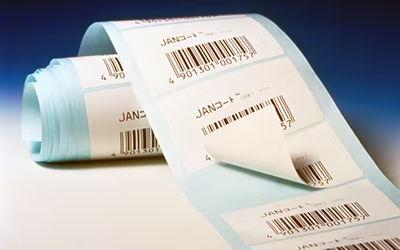Collaborating With Our Suppliers To Save Resources

Across Dow, we are working with suppliers to find circular business practices to save resources such as water. Recently, we uncovered a way to save water and reduce carbon emissions and waste in an unexpected way – through package labeling.
Product labels are of critical importance to our manufacturing and distribution sites globally. They contain necessary environmental, health, safety and trade-compliant information, to move our thousands of products through the supply chain and ultimately to our customers.
A strike in 2022 threatened to stop manufacturing in some of our European plants. When a major wood pulp producer ran out of stock for blank labels, one of our global label suppliers – Geostick – reached out with a solution.
The Netherlands-based company had started a recycling program to collect and return the backing paper from its labels. “Previously, the backing paper would have to go to landfill waste or be burnt as it is not suitable for paper recycling facilities,” said Anar Rahbarli, Dow’s sourcing manager for Geostick. “However, by collaborating with recycler Cycle4Green and Lenzing Paper, Geostick managed to get the collected paper recycled into new paper products.”
Using the collected waste material as a raw material for new production has significant advantages beyond securing new raw material supply stability. In particular, the amount of water needed to produce new backing paper is significantly higher – an estimated 59,455 gallons of water per metric ton – than the recycled version. In addition, the recycling of 1,000 kilograms of liner saves an estimated 1.5 metric tons of CO2 emissions – the equivalent of driving an average gasoline-powered passenger vehicle more than 3,700 miles. An added bonus is that Geostick also provides an annual certificate recording the weight of paper waste received and the associated CO2 savings.
“We have now put in place the collection boxes for label backing at several major sites in Europe, and we are actively encouraging sites in other geographies to adopt the process,” said Paul Reilly, a Dow global business process leader, Integrated Supply Chain. “We also have reached out to our major label supplier in North America and suggested they investigate a similar sustainable approach.”
By collaborating with our suppliers, we are seeking to help drive a more circular economy and make the most of limited resources, including water.

